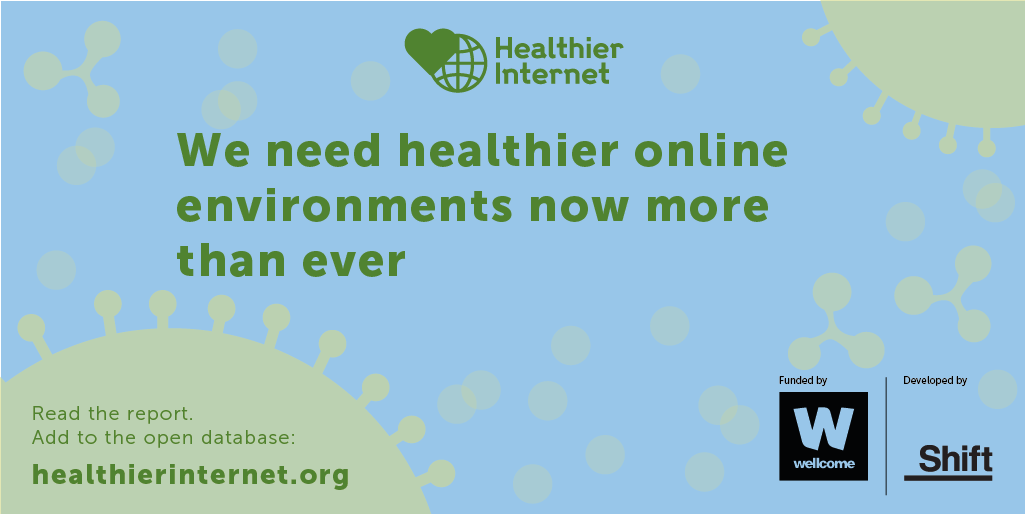What if the way we think about fixing #misinformation is wrong? My team at @wellcometrust's has done some work with @shift_org.
A thread on how we should look at the conditions that create misinformation, not just the misinformation itself. Can we create a healthier internet?
A thread on how we should look at the conditions that create misinformation, not just the misinformation itself. Can we create a healthier internet?

Up to 40% of people say that social media influences their health decisions, and that figure's higher amongst younger people, as @carlalally notes. https://wellcome.ac.uk/news/how-can-we-make-social-media-healthier-platform-health-information
And the fear that a lot of the information online is wrong, misleading, or maybe even malign isn't exactly news - but it's been put in a whole new light by the spread of Covid19, as the @Kennedy_School note. https://misinforeview.hks.harvard.edu/article/identifying-patterns-to-prevent-the-spread-of-misinformation-during-epidemics/
The Secretary General of the @UN, @antonioguterres, and of the @WHO, @DrTedros, have even talked about a twin crises - both a Covid19 pandemic and an infodemic. https://www.un.org/en/un-coronavirus-communications-team/un-tackling-%E2%80%98infodemic%E2%80%99-misinformation-and-cybercrime-covid-19
This is real.
700 people in Iran died after drinking methanol because they'd seen online misinformation suggesting it could cure Covid. https://www.independent.co.uk/news/world/middle-east/coronavirus-iran-deaths-toxic-methanol-alcohol-fake-news-rumours-a9487801.html
700 people in Iran died after drinking methanol because they'd seen online misinformation suggesting it could cure Covid. https://www.independent.co.uk/news/world/middle-east/coronavirus-iran-deaths-toxic-methanol-alcohol-fake-news-rumours-a9487801.html
Way before any of this happened, the public engagement team at @wellcometrust were trying to figure out how to think about online misinformation.
Encountering info on social media is one of the main ways the public engages with science - but it's not a medium that science has a lot of control over.
So we commissioned @shift_org to look into it - specifically, to figure out a lay-of-the-land. Who's doing what?
So we commissioned @shift_org to look into it - specifically, to figure out a lay-of-the-land. Who's doing what?
Their full report is here: https://shiftdesign.org/content/uploads/2020/07/Healthier_Internet_Report.pdf
...but the key finding for me is that there's basically six different tactics that people are using to try and address the problem;
Convene, catalyse, collect, co-ordinate, communicate, control.
...but the key finding for me is that there's basically six different tactics that people are using to try and address the problem;
Convene, catalyse, collect, co-ordinate, communicate, control.
For example, the way Facebook and Twitter censor bad information about Covid19 is a form of control; they found others, here  https://www.healthierinternet.org/healthier-internet/p/14
https://www.healthierinternet.org/healthier-internet/p/14
 https://www.healthierinternet.org/healthier-internet/p/14
https://www.healthierinternet.org/healthier-internet/p/14
And groups from Google to the EU are trying to co-ordinate the actions of everyone else:
are trying to co-ordinate the actions of everyone else:  https://www.healthierinternet.org/healthier-internet/p/16
https://www.healthierinternet.org/healthier-internet/p/16
 are trying to co-ordinate the actions of everyone else:
are trying to co-ordinate the actions of everyone else:  https://www.healthierinternet.org/healthier-internet/p/16
https://www.healthierinternet.org/healthier-internet/p/16
But the *biggest* single thing we're trying to do is *communicate*.
@shift_org didn't try and do an exhaustive search, but it's obvious that the world's automatic response to misinformation is to try and provide more information! https://www.healthierinternet.org/healthier-internet/p/13
https://www.healthierinternet.org/healthier-internet/p/13
@shift_org didn't try and do an exhaustive search, but it's obvious that the world's automatic response to misinformation is to try and provide more information!
 https://www.healthierinternet.org/healthier-internet/p/13
https://www.healthierinternet.org/healthier-internet/p/13
There is absolutely tonnes of effort going into combating online misinformation.
Everyone from tech giants to media companies to state actors and universities are having a go. https://www.healthierinternet.org/healthier-internet/p/4
https://www.healthierinternet.org/healthier-internet/p/4
Everyone from tech giants to media companies to state actors and universities are having a go.
 https://www.healthierinternet.org/healthier-internet/p/4
https://www.healthierinternet.org/healthier-internet/p/4
But, by and large, we're focusing our efforts on a route (communication) which doesn't really have a lot to show for it, in terms of success.
It's probably the easiest and most visible, though, which may explain why.
It's probably the easiest and most visible, though, which may explain why.
Shift talk through some ways forward - like getting better at figuring out what works, and providing more support to frontline health workers.
They've also built this database of misinfo initiatives, which you (yes, you!) ca help add to and populate. https://docs.google.com/document/d/1k9pVZXzQnWR7_o_tWfLFMKpQDMg2PN42g06Je--tg0M/edit#heading=h.d8cirhm1e8gg
They've also built this database of misinfo initiatives, which you (yes, you!) ca help add to and populate. https://docs.google.com/document/d/1k9pVZXzQnWR7_o_tWfLFMKpQDMg2PN42g06Je--tg0M/edit#heading=h.d8cirhm1e8gg
But the biggest takeaway for me is that we're talking about misinformation as if it's a fly in the ointment; a blot on the otherwise clean slate of the social web.
The opposite's true; the dynamics of how social media and internet incentives work create and reward misinfo.
The opposite's true; the dynamics of how social media and internet incentives work create and reward misinfo.
If the way we respond to misinformation is whack-a-mole debunking, spreading verified truths, or getting angry at individuals, we'll be swimming against the tide.
Instead, we need to create a healthier internet: https://wellcome.ac.uk/news/how-can-we-make-social-media-healthier-platform-health-information
Instead, we need to create a healthier internet: https://wellcome.ac.uk/news/how-can-we-make-social-media-healthier-platform-health-information

 Read on Twitter
Read on Twitter


